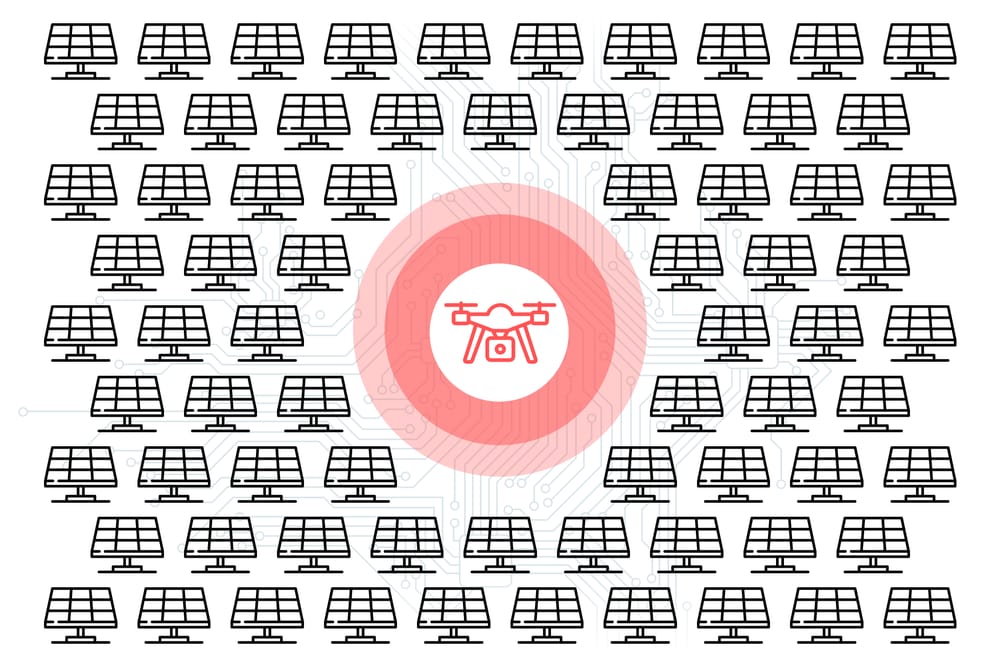The renewable energy sector is rapidly evolving, with solar energy taking the forefront as a reliable and sustainable power source.
In fact, in 2022, the solar farm market was valued impressively at $70.84 billion, with expectations of continued growth to be 18.06% through 2028, according to a global solar farm market report. A similar report reveals the growth of a parallel industry—drone inspection and monitoring, valued at $11.6 billion in 2022 and expected to grow by 14.6% to $23 billion by 2027.
Building on this upward trajectory, the use of autonomous drone technology in solar farm operations presents a golden opportunity.
Here’s why now is the perfect time for solar farm operators to integrate autonomous drone technology to help ensure maximum energy production and system longevity, offering a timely and innovative solution for solar farm inspections.
6 Key Reasons Why Solar Farm Operators Should Start Using Autonomous Drone Technology
Streamlined Historical Data Tracking + Data Storage
Maintaining accurate historical data is crucial for the effective management of solar farms. Autonomous drones make it easy to keep track of this data by systematically recording images and videos of solar panels over time.
This information is invaluable for analyzing the aging process of panels, understanding wear and tear patterns, and making informed decisions about future maintenance needs. With drones, operators can easily compare historical data sets to current conditions, ensuring a comprehensive understanding of panel health and functionality.
And since we're on the subject of data tracking, consider data storage as it has emerged as a critical issue in drone monitoring and inspection.
In recent years, concerns have been raised about DJI, a prominent Chinese company, due to its practice of storing data on servers located in China. This has sparked debate over data vulnerability and raised questions about the security of sensitive information. Though this might not be a reason to go autonomous, you might want to look into your provider's data privacy policy before making the purchase.
Reduced Inspection Time
Traditional methods of solar farm inspection can be time-consuming, often requiring manual labor to inspect each panel on foot or by manned vehicles. Although the next generation of inspections included manually flown drones, these inspections were still performed on foot and remained time-consuming. The current generation is autonomous. Autonomous AI-powered drones are now capable of conducting quick and precise assessments more frequently, allowing inspectors to focus on other tasks or even take a break to chat with site managers. It is worth noting that solar panels should be inspected under optimal weather conditions. Furthermore, the docking station can ensure that all relevant data is collected during these conditions to facilitate accurate comparisons.
Comprehensive Panel Inspections
Drones equipped with advanced imaging technologies can inspect every solar panel with precision. They use tools like thermal imaging to detect any inefficiencies or anomalies that might not be visible to the human eye. This ensures that each panel is operating at optimal efficiency and that issues, no matter how small, are addressed promptly.
Many autonomous drone companies are now starting to offer tailor-made software solutions for solar farm operators. By using drones customized to specific operational needs, operators can access precise data and analytics that cater specifically to the unique layout and environmental conditions of their farms.
Cost Reduction in Solar Inspections
By integrating autonomous drones, solar farm operators can achieve significant reductions in inspection costs, potentially decreasing expenses by 30-40%. Reducing the need for manual labor not only cuts down on labor costs but also minimizes the risk of workplace accidents, which can lead to insurance and liability expenses.
Additionally, the efficiency of drones allows for quicker inspections and less operational downtime, which can otherwise lead to lost revenue.
Aiding Panel Warranty Claims
Warranty claims for solar panels require precise data about the defect and its impact on the solar panel’s performance. Drones collect detailed, accurate data that can be used to support warranty claims, ensuring that operators can back up their claims with solid evidence. This streamlined process aids in the quick resolution of claims, helping maintain the integrity and financial stability of solar farm operations.
Fault and Issue Detection
Autonomous drones are particularly effective in detecting a wide range of faults or issues that might affect a solar panel's performance. Such issues include:
- Soiling
- Shading
- Temperature changes
- Physical damage
- Electrical risks
- Corrosion
Drones can quickly identify problems and relay this information back to operators in real time. This capability allows for immediate action to rectify issues, maintaining the overall efficiency and productivity of the solar farm.
Conclusion
The integration of autonomous drones into solar farm inspections represents a significant advancement in how renewable energy operations are managed and maintained.
The benefits of using drones are clear: they provide a more thorough, cost-effective, and efficient means of ensuring solar farm health and longevity. As technology continues to advance, the capabilities of these drones will only increase, making now an ideal time for solar farm operators to adopt this transformative solution. By doing so, they not only enhance their operational efficiency but also contribute to the broader goal of sustainable and reliable energy production.

